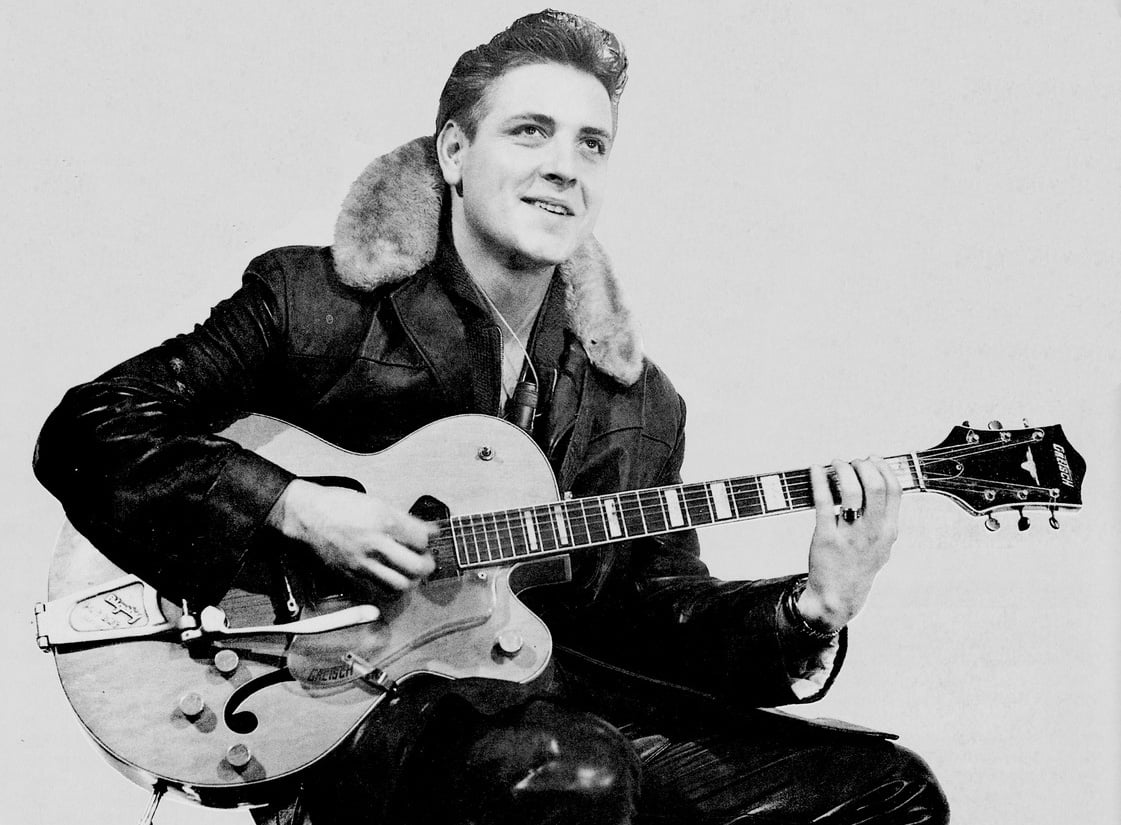
After the infamous February 1959 plane crash that claimed the lives of Buddy Holly, Ritchie Valens, and the Big Bopper, which Cochran would memorialize in the song "Three Stars," Cochran became wary of extensive touring and wanted to devote more time to writing and recording. As Cochran became more accustomed to the recording studio, he began to experiment with overdubbing multiple guitar parts in the manner of Les Paul, and he helped out friends in the studio, playing lead guitar on sessions for honky tonk hero Skeets McDonald and adding backing vocals on the album A Gene Vincent Record Date. It gave Cochran his first Top Ten single, rising to number eight on the sales charts, and "C'mon Everybody," a celebration of the rock & roll house party, followed it into the Top 40 in January 1959. Eddie's first album, Singin' to My Baby, was issued before 1957 was out, and he made a second film appearance that same year, playing a small role in the teen exploitation flick Untamed Youth, where he sang the song "Cotton Picker."Įddie Cochran made a major breakthrough and scored his biggest hit in August 1958 with "Summertime Blues" (co-written by Cochran with Jerry Capehart, his manager), an upbeat but relatable litany of teenage gripes against the adult world. But his first chart success, 1957's "Sittin' in the Balcony" b/w "Dark Lonely Street," was more of a pop number, relatively polite, and while "Mean When I'm Mad" and "Twenty Flight Rock," released later the same year (the latter featured in The Girl Can't Help It), were in line with what would become his trademark sound, neither made the singles charts in America.

Between his casual good looks, impressive skills as a guitarist, and energetic vocal style, Cochran seemed an ideal choice to be a rock & roll star, and that same year he landed a role in the first great rock movie, The Girl Can't Help It, which also featured Fats Domino, Gene Vincent, Little Richard, and Jayne Mansfield. Though he would continue to write songs with Hank Cochran, Eddie struck out on his own and cut his first solo single, "Skinny Jim" b/w "Half Loved," in 1956. But as rock & roll began entering public consciousness, Eddie fell under the spell of Chuck Berry, Little Richard, Carl Perkins, and other early rock heroes. Fiddle" b/w "Two Blue Singin' Stars," in 1955, and the duo was modestly successful.

The Cochran Brothers released their first single, "Mr.
#Eddie cochran professional#
After a year of high school, Cochran dropped out to become a professional musician, and in 1954 he began working with fellow country musician Hank Cochran while the two were not related, they played out as the Cochran Brothers. In 1950, the Cochran family left the Midwest for Bell Gardens, California, and Eddie formed his first band while he was in junior high, playing hillbilly songs with his friends. Cochran was a schoolboy when he began playing the drums, and he soon moved on to teach himself guitar and piano. His parents were originally from Oklahoma, and his earliest influences were in country music. Cochran was also one of the first American rockers to tour the United Kingdom, where he would prove especially influential when Paul McCartney first met John Lennon, the latter was impressed that the former could not only play Cochran's "Twenty Flight Rock," but knew the lyrics by heart.Įddie Cochran was born on Octoin Albert Lea, Minnesota. Songs like "Summertime Blues," "C'mon Everybody," "Somethin' Else," "Nervous Breakdown," and "Weekend" would live on in covers decades after Cochran passed, and his influence would be felt in artists as diverse as Bobby Fuller and the Sex Pistols. Cochran was also an impressive guitar player and a songwriter young enough to understand the teenage mindset and its fascination with cars, girls, and good times, but he was also talented enough to bring his stories to life and marry them to energetic, catchy melodies. Cochran would often be cited as one of the pioneers of rockabilly, but his style was more muscular and less twangy than those of his peers, adding a bluesy accent to the music that meshed comfortably with his country-influenced melodies.


Eddie Cochran was one of the first great stars of rock & roll and an artist whose influence would far outstrip his brief career, which was cut short when he died in an auto accident in 1960.


 0 kommentar(er)
0 kommentar(er)
